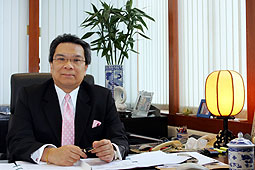 |
| Fact finder: ICAC Head of Operations Daniel Li says what makes an outstanding investigator is his ability and perseverance to find out the truth. |

|
This year's first quarter saw 820 corruption reports, of which 35% were against government departments, 58% against the private sector and 7% against public bodies, ICAC Head of Operations Daniel Li says.
The commission received 3,685 corruption reports last year, down 2% over a year earlier.
Commenting on Hong Kong's corruption situation, he said the civil service here is largely clean. Cases cracked by ICAC revealed only individual civil servants who yielded to the temptation of graft.
Clean civil service
"However, it is impossible to wipe out corruption completely, especially in a highly commercialised city and an international financial centre like Hong Kong. We will continue to combat vigorously corruption cases in the business and finance sectors to maintain Hong Kong's reputation as a clean city," said Mr Li.
"Our experience showed that in times of economic prosperity, there should be more corruption opportunities but the number of reports might not increase accordingly. Conversely, the number of reports might rise with a sluggish economy because people felt more frustrated.
"Nonetheless, the ICAC will remain vigilant against all kinds of corrupt activities, regardless of the economic situation."
Professional training
Mr Li pointed out professional training for ICAC investigators should be enhanced to "outsmart" criminals in combating increasingly sophisticated corruption crimes.
To tackle complex corruption cases, the commission's Financial Investigation Section last year conducted 140 assignments in financial analysis and asset tracing, involving 1,160 transactions totalling $6.25 billion. The Computer Forensic Section had its caseload increased three-fold last year compared to six years ago when the section was established, with 538 computer data analysis completed.
Mr Li stressed continuous training in financial investigation, computer analysis and forensics, as well as experience-sharing with overseas law-enforcement agencies will sharpen officers' investigative edge.
In recent years, investigating officers were sent to take part in a number of local and overseas training programmes, including courses on financial investigation hosted by law-enforcement agencies in Thailand and Singapore and attachment programmes at the Metropolitan Police London.
Global exchange
The third ICAC Symposium in early May will provide a global forum for cementing co-operation and experience-sharing between law-enforcement agencies and related organisations the world over.
The Operations Department will also benefit from more comprehensive training facilities with the completion of the commission's new headquarters building next year, Mr Li added.
Truth finder
Mr Li, who has served the commission for almost 30 years, said: "What makes an outstanding investigator is his ability and perseverance to find out the truth.
"After three decades of hard work, Hong Kong has evolved from being a city plagued with rampant corruption to one of the world's cleanest places. We at the ICAC will spare no effort to safeguard this valuable asset."
Go To Top
|



